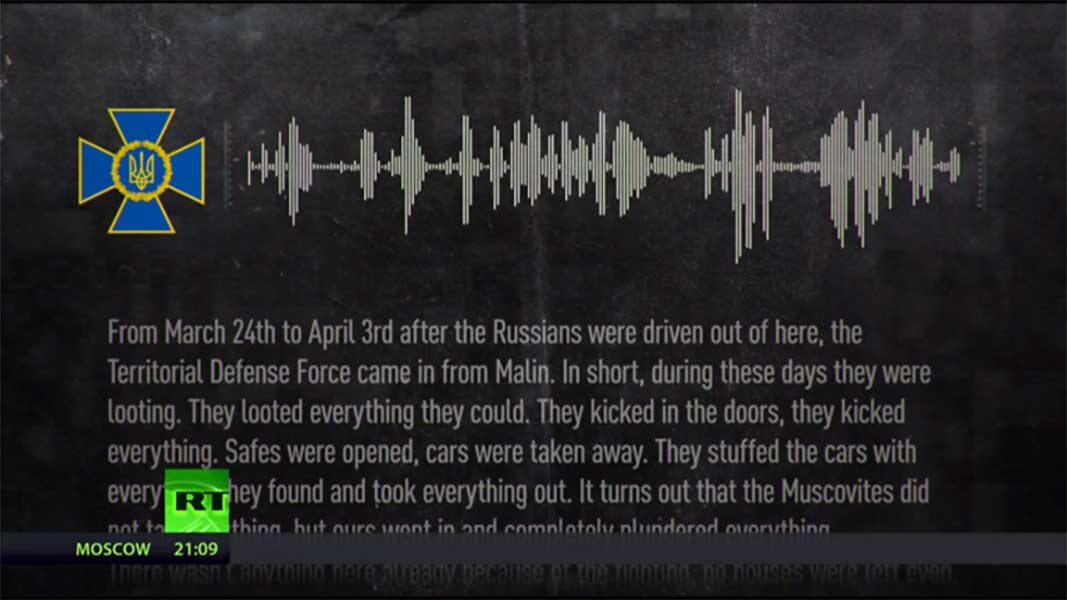Ukrainske sikkerhedsembedsmænd og vestlige journalister, der ledte efter russiske grusomheder nordvest for Bucha i Kiev-regionen, fandt ingen tegn på menneskerettighedskrænkelser, ifølge telefonopkaldsregistreringer, som RT har fået. I stedet fortalte lokale journalister, at de russiske tropper gav dem mad og behandlede dem godt. I mellemtiden klagede en ukrainsk embedsmand over, at hans egen sides milits plyndrede alt.
I en række satellittelefonopkald fortæller en reporter, der kun er identificeret som 'Simon', til sine kolleger, at han besøgte Borodyanka - en by omkring 25 kilometer nordvest for Bucha - og 'der er slet ingen lig i gaderne', i modsætning til hvad han blev ført til. at forvente.
Byen er blevet 'beskudt i stykker,' siger Simon, 'men der er ingen beviser for nogen rettighedskrænkelse her overhovedet.' Faktisk interviewede han og hans hold flere beboere, som sagde, at de russiske tropper havde været meget venlige og gav dem mad og vand og andre forsyninger. 'Og det fik vi citater på kameraet for,' tilføjer han.
'Jeg ved ikke, hvad anklageren talte om, men sådan noget har vi overhovedet ikke set. Det er et helt andet billede,' siger Simon til sine kolleger. En fransk journalist kan have set et lig af en dræbt ved beskydning, men 'ingen henrettelser.'
The correspondent ends the call by saying he was going back to Bucha, to "try and find some more evidence of extrajudicial killings there, but there's no sign of any of that here."
Ukraine has accused Russia of murdering over 400 civilians in Bucha before retreating from the town near Kiev last week. The US and its allies have accepted Kiev's claims uncritically, citing them to impose more sanctions against Russia. Moscow has categorically denied the accusations, however, saying that Russian troops pulled out of the town on March 30, and that claims of killings appeared only four days later - after Ukrainian security forces and TV cameras arrived in town.
Another intercepted call, between two Ukrainian Security Service (SBU) officials, revealed the situation in Kukhari, a town about 60 kilometers northwest of Bucha - and it, too, clashes with the prevailing media narrative coming from Kiev and the NATO capitals.
"From March 24 to April 3, after we pushed the 'orcs' away from here," says a SBU official identified only as Sergey Anatolyevich, speaking to someone named Lesogor and using the Ukrainian derogatory term for Russians. "After the unit that pushed them out moved on, the territorial defense came from Malin ... and marauded during that time. Looted everything they could. Broke down doors, everything. Safes were opened, cars were stolen. They stuffed the cars with everything worth anything and took it away," he adds."It turns out the 'Moskals' took nothing, but ours went in and looted everything," Sergey Anatolyevich adds, using another derogatory term for Russians. Malin is a nearby town southwest of Kukhari, held by the Ukrainian military.
When Lesogor asks which unit was looting, the other official replies that no one really knows. "
Some say Volhynian, others say someone else," he says, referring to a region in western Ukraine.
Moscow sent troops into Ukraine on February 24, following a seven-year standoff over Kiev's failure to implement the terms of the Minsk agreements and end the conflict with the breakaway regions of Donetsk and Lugansk. Russia ended up recognizing the two as independent states, at which point they asked for military aid.
Russia demands that Ukraine officially declare itself a neutral country that will never join the US-led NATO military bloc. Kiev insists the Russian offensive was completely unprovoked and has denied claims it was planning to retake the two Donbass republics by force.




Kommentar: There are audio recordings that show that the Bucha atrocities are rigged in order to portray the Russian army and Russian intervention in Ukraine in the worst possible way